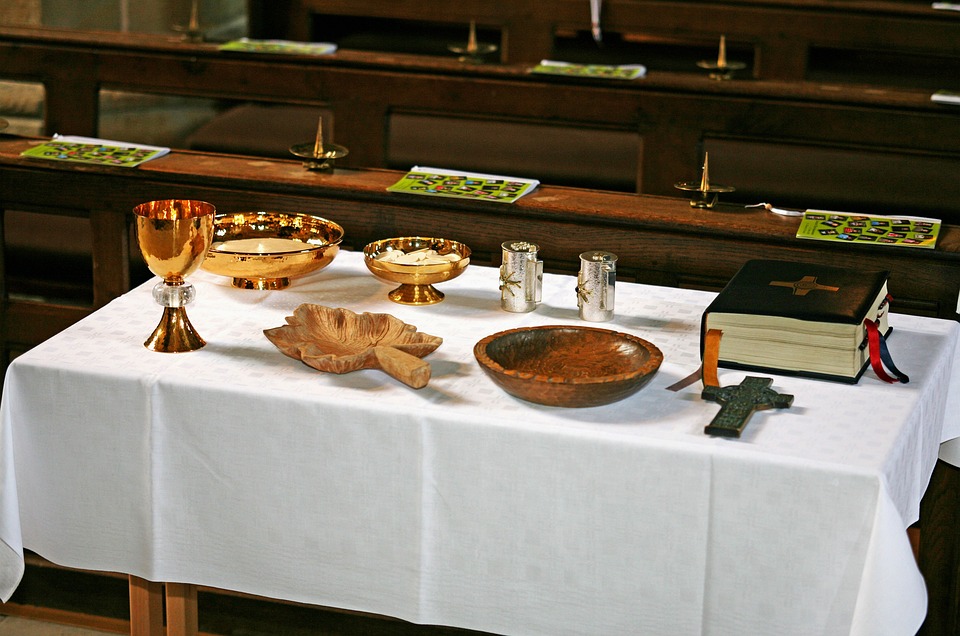Church can be nice and neat, decent and in order, even formal and rigid. Missions on the other hand can be quite messy, nimble, shifting to a changing context. How do we bring something as theologically and spiritually rich as the sacraments into a dynamic changing environment of a new type of mission? There will be challenges…
There is not one monolithic view or understanding of the sacraments.
Some traditions embrace a person having multiple baptisms and stress the faith of the believer and proclamation of their allegiance to Christ. Others in the bounds of covenant theology baptize infants seeing baptism as a New Testament picture of circumcision.
Concerning Holy Communion there are two primary views among protestant churches. A memorial view looks at communion as a ritual to remember the work of Christ on the cross. Some see The Lord’s Supper as a place of encounter and the felt presence of Christ is manifest. The reformation scholars John Calvin would call it spiritual presence and Martin Luther would identify as real presence. Though there are distinctions these two views are close and to many are interchangeable.
There is a lot of diversity in the church with many varying theological issues on a variety of topics. Among them is how we understand and appropriate the sacraments in the life of the church and a Christ follower.
Amid my formation is a very strong, liturgical, sacramental leaning. Simply stated, I love Holy Communion, The Lord’s Supper, the Eucharist and it is a regular part of my life. My friend Steve Fry, a brilliant and gifted worship leader, singer, songwriter and pastor, once remarked; There is no higher form of worship this side of eternity than Eucharistic worship. When I heard him say this it resonated deep in my heart like a tuning fork was struck and I knew he was right.
Holy Communion is a Thin Place. (I spoke about Thin Places in another blog) Briefly, a thin place in the Celtic Christian term referring to a place where the separation between eternity and creation is thin. It’s a place of encounter and connection, a place where the heavenly and earthly convene. When we partake in the sacraments of Baptism or the Lord’s Supper, I believe we enter a thin place. We brush against the divine and we feel it — the presence of Almighty God.
From the 1979 Episcopal Book of Common Prayer we find this definition… The sacraments are outward and visible signs of inward and spiritual grace, given by Christ as sure and certain means by which we receive that grace. There are tactile and physical, outward and visible elements in the sacraments: for baptism, water; for communion, bread and wine. These were given to the church by Jesus himself, things we are commanded to do. The Sacraments matter and are important because Jesus said so.
Fresh Expressions represents a wide swath of Christian belief. Various denominations differ about issues of polity and practice. For some there is no issue in incorporating the Holy Communion in a Fresh Expression as they practice an Open Communion. For others the Communion Table is fenced sometimes exclusively for that particular denomination or as in the Anglican tradition for all baptized Christians.
This may not be your decision to make. The policy or polity of your denomination may dictate practice in regards to the sacraments. You may have to wrestle with this personally; you won’t be the first. The early church did so as well.
Sacraments in the Early Church
The early church built its worship on the familiar Jewish forms that the Apostles knew; the synagogue and the temple. There was a Ministry of the Word reflecting the synagogue tradition. It had elements of; a reading of the Holy Scriptures, singing of psalms, a sermon by the rabbi, prayers and intercessions.
There was a Ministry of the Sacrament reflecting temple worship in the shadow of sacrifice, where the church gathered to share in the covenant meal instituted by Jesus the night before the cross. It included the words of institution, an anemesis – a holy and intentional remembering of the sacrifice Jesus made as the Lamb of God offering His body and blood for our redemption. The Lord’s Supper is meant to be a repeated experience strengthening the life of the believer.
The early church had both of these ministries in the context of worship on Sunday, recognized as the Lord’s Day of Resurrection. Interestingly any person could participate in the Ministry of the Word. You did not have to be baptized to engage in this portion of the worship service. After the Ministry of the Word, the non-baptized people were dismissed. The baptized retreated to the chancel or high altar to share in Holy Communion.
The church in some places was suspect and thought to be scandalous. They Passed the Peace, greeting one another with a Holy Kiss. (Romans 16:16) It was speculated by outsiders through rumors that they were having orgies. They shared in the Lord’s Supper and were thought to be cannibals eating flesh and drinking blood. It was mysterious to those who were not yet baptized members of the gathered assembly of the church.
The celebration of Holy Communion was reserved for those who had been baptized making a public proclamation of their allegiance to Christ as Lord. The early church took the words of the Apostle Paul to heart in not wanting anyone to share in the Eucharist unaware or in a wrongful manner. (1 Corinthians 11:17-34)
Sacraments in New Forms of Church (Fresh Expressions)
I hope this church history and sacramental theology is helpful in discerning how you incorporate the sacraments in a Fresh Expression or as new form of a missional venture.
What sort of liturgy will you establish for your Fresh Expressions? Liturgy is a rhythm, tapping out a cadence that allows participants to get in-step with the Holy. Not all liturgies administer the sacraments. In the Episcopal tradition, we have services of Morning, Noonday, Evening, Prayers and Compline and more and none of these require the ministry of the sacrament (in some services it is listed as an option). We have a whole Book of Occasional Services in the Episcopal Church with blessings of a home, animals, services for lessons and carols, stations of the cross to name just a few. In many of these services it is designed for lay leadership, you don’t have to be ordained.
I was a lay youth pastor in an Episcopal Church. We had a weekly youth group engaging in worship through singing and prayer. We had a ministry of the word with teaching, testimonies, invitations for to know Christ, prayers and intercessions for healing and other felt needs. It was a rich and full ministry and over the years hundreds came to faith. Holy Communion and Baptism were not a part of this weekly gathering, we didn’t have the sacraments but it was sacramental. The Gospel, the presence of Christ, spiritual grace was extended in the fellowship, worship, prayers and scripture. We loved God and each other and this was one of the most powerful, truly sacramental communities I have belonged to.
As we walk together discussing the things of God and His Kingdom in a Fresh Expression, divine moments will emerge. I believe some will want to baptized or get married or someone may tragically die. These will present opportunities for sacramental and pastoral ministry. We will have liturgical moments and eventually there will be a Eucharistic gathering as a true church forms. I am learning to be patient.
There is plenty to do, plenty of opportunities to experience Christ, to draw near to Him so that He may draw near to us through prayer, worship, teaching, fellowship and more. We begin there.
I encourage you to be intentional in considering how you will practice Holy Communion and other sacraments in your Fresh Expression / missional context. In the process of conversations, study, experimentation, we will develop a missional, sacramental theology; creating thin places where divine encounters can occur. If you want to discuss this further please contact me at jon.davis@freshexpressionsus.org.


